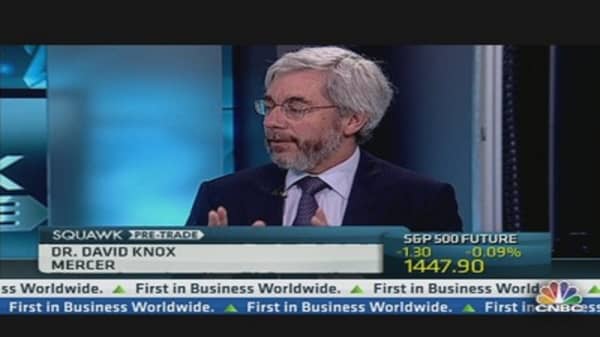As populations rapidly age, reform to straining pension systems must happen now or we will all pay the pay the price when we retire, according to the latest report on pension provision.
The Melbourne Mercer Global Pensions Index released earlier this week compared 18 national pension systems across the globe and rated them on the adequacy, sustainability and integrity.
It found that Denmark has the best pension scheme in the world, followed by the Netherlands and Australia. The U.K.. came in seventh place and the U.S. closely behind at ninth in the rankings.
Given an "A" grade by Mercer, Denmark came first place due to its well-funded public pension system. It has a high level of assets and contributions and provides adequate benefits and, in addition, has a private pension system with well-developed regulations, the report states.
Dr. David Knox. Senior Partner at Mercer and author of the report told CNBC that if countries such as the U.K. and U.S., which ranked at 64.8 and 59.0 respectively on the Mercer index (compared the Denmark's winning 82.9) must reform their public and private pension systems.
"We need to reform both, " Knox told CNBC Europe's "Squawk Box".
"In the public pension we need to recognize that we are all living longer and so the retirement age needs to greatly increase — and the U.K and other countries are indeed doing that. In the private sector, we need more people to [contribute] to the pension system."
"The more people we have, the more money is going into the system and the more assets we have access to in the future."
Knox told CNBC that the younger generation had to look to the future.
"You've got to look to the future for the next 30, 40, 50 years…the younger generation have the pressures on them of debt, loans and house prices but if money is not put aside now, they won't have money for their retirement. It's that simple."
He added that as populations lived longer and fertility rates declined, fewer people would enter the workforce in the next few decades, reinforcing to the need for governments to reform pension systems.
"Now is the time to reform, to continue to reform. As the OECD says, no country is perfect, every country needs to continue to reform its pension system."
Referring to the report, Know said that countries that scored well had virtually mandatory pension systems for everyone of working age. The U.K. is introducing such a policy, under which workers will be auto-enrolled in a pension scheme. Nearly three out of every four adults in the U.K. did not pay into a pension in 2009, Mercer reports.
Knox added however that reform needed to take place gradually to change our current lackadaisical pension culture .
Pension schemes needed to be transparent, he said, with defined contributions and consumer choice of where their money is invested in order to have more control over riskier asset investment.
The U.K.'s collective private pension deficit (of 6, 432 pension schemes) fell from £280 billion ($452.3 billion) at the end of August 2012 to £229 billion a month later, according to the Pension Protection Fund (PPF) organization.
Pension data released by JLT Pension Capital Strategies in October showed that the total deficit of FTSE 100 defined benefit pension schemes has increased by two thirds in the past year. The report stated that some companies, such as RBS, BAE Systems and BT, committed to paying out pensions that are worth more than double their market value.




